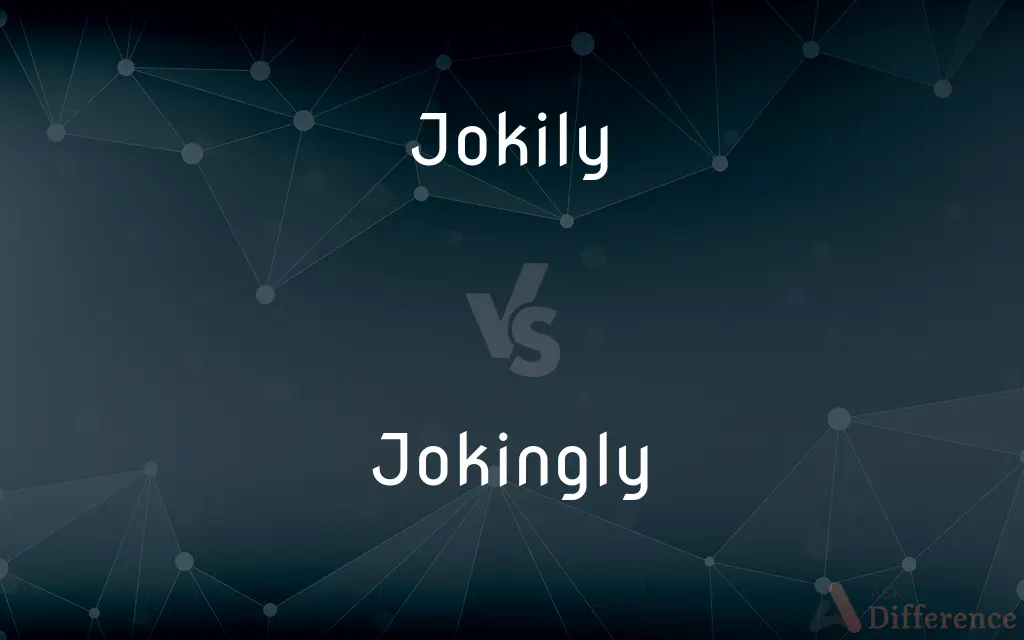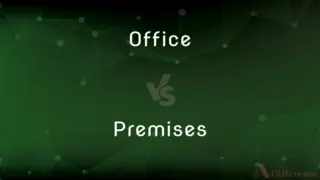Jokily vs. Jokingly — What's the Difference?
By Fiza Rafique & Maham Liaqat — Updated on March 31, 2024
Jokily refers to acting with humor, while jokingly is about making jokes or speaking in jest.

Difference Between Jokily and Jokingly
Table of Contents
ADVERTISEMENT
Key Differences
Jokily describes a manner or behavior that is light-hearted or playful, often characterized by a disposition to make jokes. Whereas, jokingly refers more specifically to the act of making jokes or comments in a humorous way, intending to amuse others.
When someone behaves jokily, it implies a consistent humorous demeanor or personality trait, suggesting they frequently engage in humor. On the other hand, acting jokingly might be situational, describing a moment where a person makes a joke or speaks humorously, regardless of their usual demeanor.
The term jokily can denote a broader range of humorous behavior, not limited to verbal jokes. It can include physical comedy, facial expressions, or other forms of humor. Jokingly, however, is typically used in the context of spoken or written humor.
Using "jokily" can imply a natural, inherent quality of being funny or inclined to humor in one’s actions or expressions. Meanwhile, "jokingly" is more about the intention behind the words or actions, emphasizing the purposeful making of a joke.
Despite these nuances, both terms share the common ground of humor. The key difference lies in their application: jokily captures a general humorous attitude, while jokingly focuses on the act of making jokes as a specific event or behavior.
ADVERTISEMENT
Comparison Chart
Definition
Describes a humorous or light-hearted demeanor.
Refers to the act of making jokes or humorous comments.
Context
Can apply to overall behavior or personality.
Often used for specific instances of humor.
Range of Use
Broader, can include non-verbal humor.
Primarily verbal or written humor.
Connotation
Suggests a playful or amusing nature.
Focuses on the intention to amuse through jokes.
Specificity
More general, describing a trait.
More specific, describing an action.
Compare with Definitions
Jokily
In a playful or humorous manner.
He responded jokily to the serious question, lightening the mood.
Jokingly
In a manner of making jokes or speaking humorously.
He jokingly warned her about the dangers of eating too much cake.
Jokily
Indicates a generally humorous disposition.
Known for her jokily demeanor, she always made her friends laugh.
Jokingly
Used for particular moments of humor.
She mentioned, jokingly, that she could eat a whole pizza by herself.
Jokily
Encompasses a broad range of humorous behaviors.
He walked into the room jokily, wearing a funny hat.
Jokingly
Focuses on verbal or written jokes.
He jokingly called himself an expert after fixing the printer.
Jokily
Includes physical comedy or expressions.
She waved her hands jokily, mimicking a dance move.
Jokingly
Highlights the intent to make a joke.
She replied jokingly to his serious suggestion, creating a moment of levity.
Jokily
Implies a light-hearted attitude or approach.
The team tackled the project jokily, making the work enjoyable.
Jokingly
Often temporary, for the moment's humor.
They exchanged glances and then commented jokingly on the situation.
Jokily
Characterized by joking or jokes, especially stale or clumsy jokes
Jokey bumper stickers.
Jokingly
Something said or done to evoke laughter or amusement, especially an amusing story with a punch line.
Jokily
In a joky manner; jokingly, humorously.
Jokingly
A mischievous trick; a prank
Played a joke on his roommate.
Jokingly
Something that is of ludicrously poor quality
Their delivery service is a joke.
Jokingly
Something not to be taken seriously; a triviality
The accident was no joke.
Jokingly
An object of amusement or laughter; a laughingstock
His loud tie was the joke of the office.
Jokingly
To tell or play jokes; jest.
Jokingly
To speak in fun; be facetious
You have to be joking.
Jokingly
To say or write as a joke.
Jokingly
In a joking manner.
Jokingly
In a joking way; sportively.
Jokingly
In jest;
I asked him jokingly whether he thought he could drive the Calcutta-Peshawar express
Jokingly
Not seriously;
I meant it facetiously
Common Curiosities
What does jokingly mean?
Jokingly is used to describe the act of making jokes or humorous comments, usually in a specific instance.
Can a situation be described as jokily?
Yes, a situation can be described as jokily if it's characterized by a general sense of humor or playfulness.
Can someone be both jokily and jokingly at the same time?
Yes, someone can exhibit a jokily demeanor overall and also make specific jokes or comments jokingly.
Is jokingly more about intention?
Yes, jokingly emphasizes the intention behind making a joke or a humorous comment.
Do jokily and jokingly have different connotations?
While both are related to humor, jokily suggests a playful demeanor, and jokingly focuses on the act of making jokes.
What does jokily mean?
Jokily refers to a manner or behavior that is humorous or playful, often indicating a personality trait.
Is jokily only used for verbal humor?
No, jokily can refer to both verbal and non-verbal forms of humor, including actions and expressions.
Can an action be described as jokily?
Yes, actions, not just speech, can be described as jokily when they're done in a humorous or playful way.
How do you decide whether to use jokily or jokingly?
The choice depends on whether you're describing a person's overall humorous demeanor (jokily) or a specific act of humor (jokingly).
How do jokily and jokingly differ in context?
Jokily is more about a general humorous demeanor or trait, while jokingly refers to specific acts of making jokes.
Can jokily describe a person’s character?
Yes, describing someone as jokily suggests they have a naturally playful or humorous character.
Does jokingly imply sarcasm?
Jokingly can include sarcasm but doesn't necessarily imply it; it broadly encompasses all forms of humor.
Is it possible to use jokingly in a serious context?
Jokingly can be used in serious contexts to lighten the mood or introduce humor, often indicated by the speaker's tone.
Can jokingly be used to describe a joke gone wrong?
Yes, jokingly can describe the intention behind a joke, even if the outcome wasn't as expected.
How do cultures influence the interpretation of jokily and jokingly?
Cultural differences can affect how humor is perceived and what is considered humorous, thereby influencing the interpretation of both terms.
Share Your Discovery

Previous Comparison
Dominate vs. Predominate
Next Comparison
Office vs. PremisesAuthor Spotlight
Written by
Fiza RafiqueFiza Rafique is a skilled content writer at AskDifference.com, where she meticulously refines and enhances written pieces. Drawing from her vast editorial expertise, Fiza ensures clarity, accuracy, and precision in every article. Passionate about language, she continually seeks to elevate the quality of content for readers worldwide.
Co-written by
Maham Liaqat













































